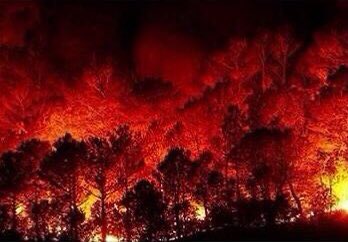Suhail Deeb was eager to harvest his olives before sweeping forest fires that ravaged parts of Syria at the weekend left him with nothing but charred trunks and branches.
“I used to have 100 trees, but now nothing is left,” said the 61-year-old farmer at his blackened olive grove in the western province of Tartus.
“Everything has turned to ashes,” he said, sadly snapping a soot-covered, dead branch off a tree.
Blazes broke out Friday in the provinces of Homs, Tartus and Latakia, destroying over 9,000 hectares of agricultural and forested land, according to the UN Office for the Coordination of Humanitarian Affairs (OCHA).
The wildfires killed three people in Latakia and displaced thousands across the three provinces, OCHA said.
Authorities on Sunday said that the fires had been brought under control.
A day later, smoke still rose from the hills around Latakia and Tartus, previously covered with fields, groves and healthy forests.
“I have never seen fires like this in my entire life,” said Deeb, who had inherited all his trees from his father.
The olive farmer, like all Syrians, has been hit hard by a biting economic crisis that has seen the Syrian pound plummet against the dollar.
He was eagerly waiting for this season’s harvest which was to begin this month so he could produce some olive oil to sell in the market.
“We were depending heavily on this season to compensate for our repeated losses,” he told AFP.
“The olives were ripe and large and, had it not been for the fires, we would be preparing now to harvest them.”
‘Real catastrophe’
OCHA estimates that the fires affected up to 140,000 people by destroying or damaging homes and other assets, including agricultural land.
In the town of Mashta al-Helu in Tartus, more than 65 farmers were affected by the blaze, including Ali Issa.
Sitting on a rock, his back leaning against a burnt tree, Issa lamented his losses, even though many of his crops survived the blaze.
“We have endured very difficult conditions during the war,” he said. “But the fires are of a different scale. We are facing a real catastrophe.”
Nine years of war have battered Syria’s economy but the country has continued to produce large quantities of olive oil which is among its staple exports.
The agriculture ministry had predicted in August an olive crop harvest of 850,000 tons this season – up from 665,000 the year before.
Issa said he was determined to replant what he lost, calling the olive tree both “blessed and holy.”
“We will replant not so that we can eat from them, but for our children,” he said.
The fires across Syria did not only hit agricultural lands but also residential and industrial areas.
According to OCHA, up to 25,000 people have been displaced as a result.
On social media, users have been posting photos of the many blazes with the Arabic hashtag “Syria is Burning.”
Joseph Eid, the mayor of Mashta al-Helu, assessed the damage in the aftermath of the fires.
He pointed to empty parks that were crowded with families this time last year.
“The fires cause a lot of damage,” he told AFP. “The land will need years to recover.”
The Syrian Observer has not verified the content of this story. Responsibility for the information and views set out in this article lies entirely with the author.


